Module 8 Story time模块导学课件
文档属性
| 名称 | Module 8 Story time模块导学课件 | 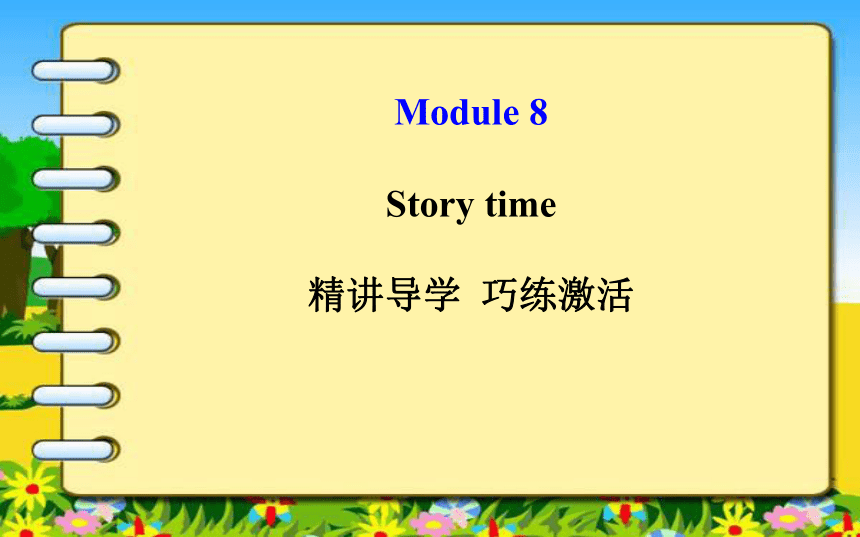 | |
| 格式 | zip | ||
| 文件大小 | 4.2MB | ||
| 资源类型 | 教案 | ||
| 版本资源 | 外研版 | ||
| 科目 | 英语 | ||
| 更新时间 | 2015-03-21 14:39:00 | ||
图片预览

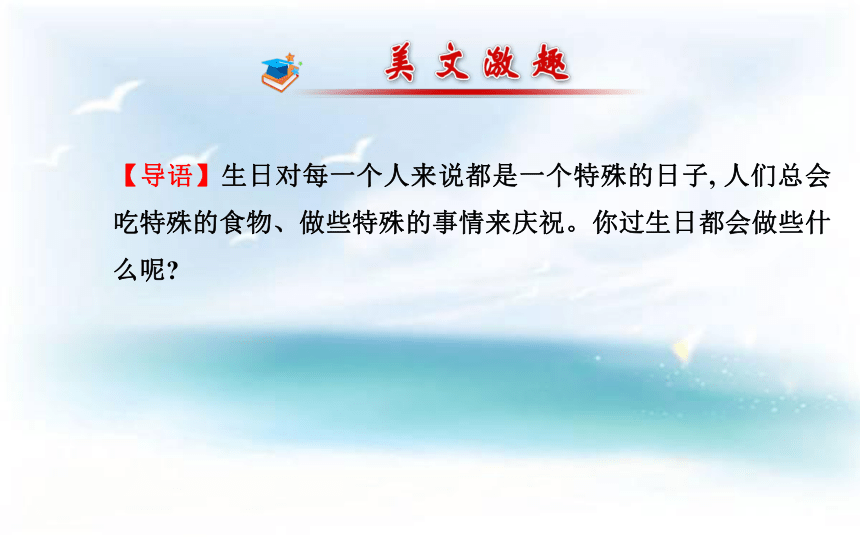
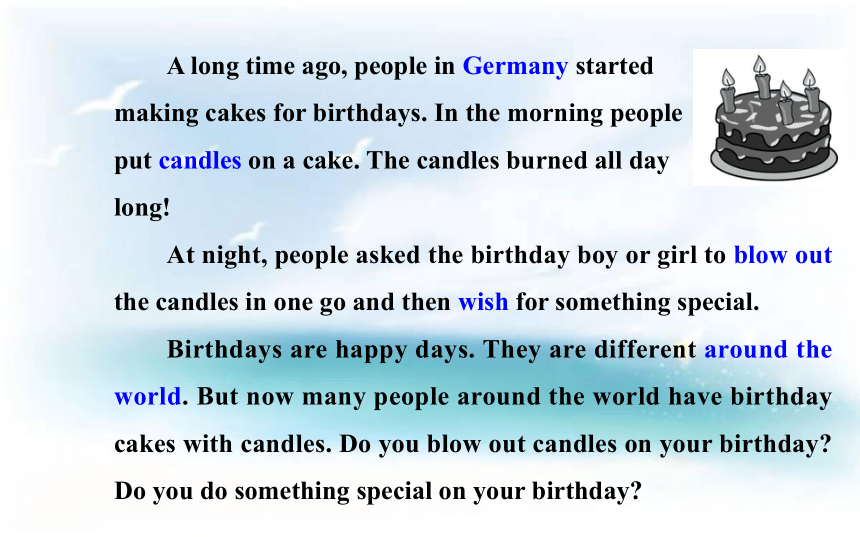
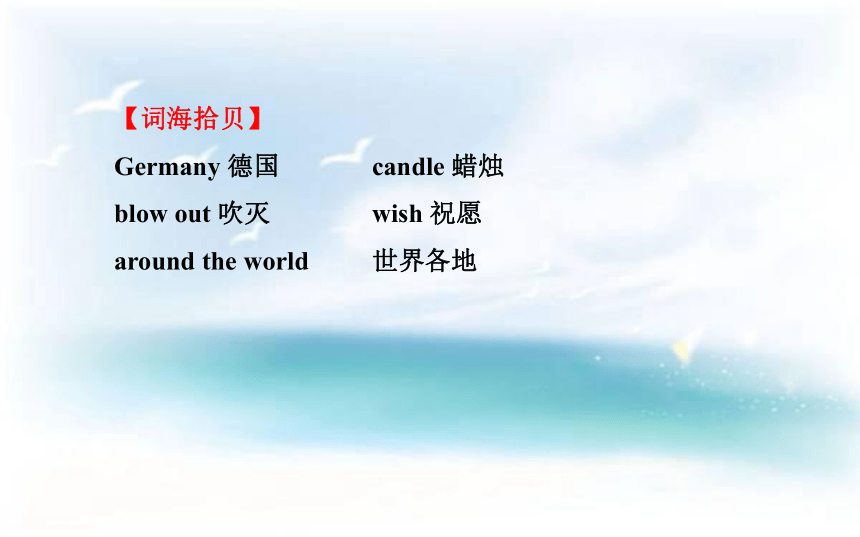
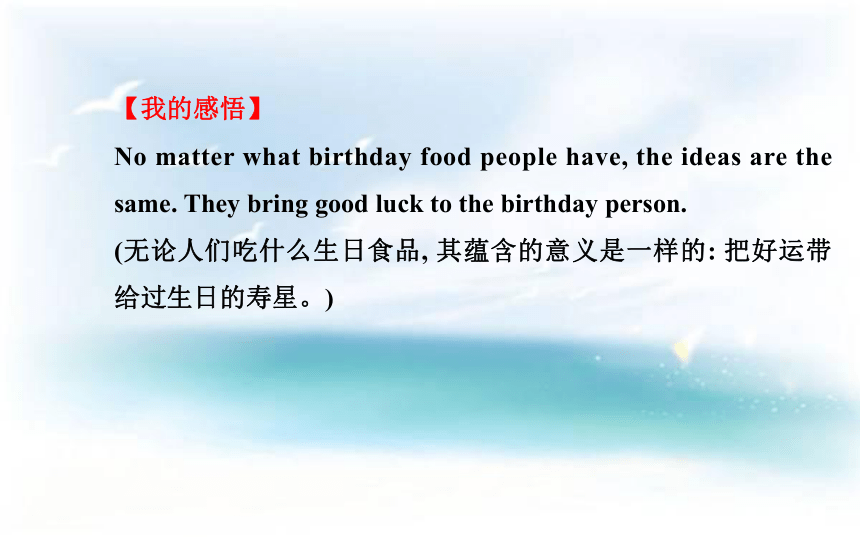
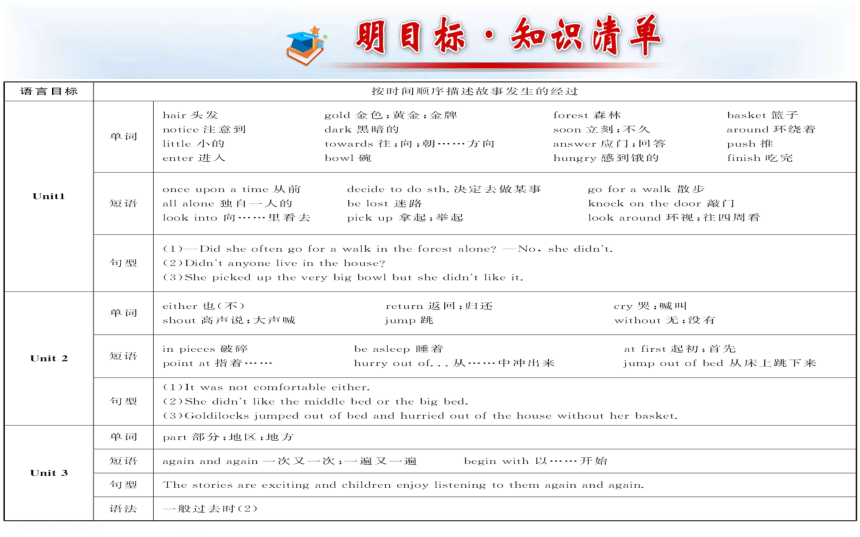
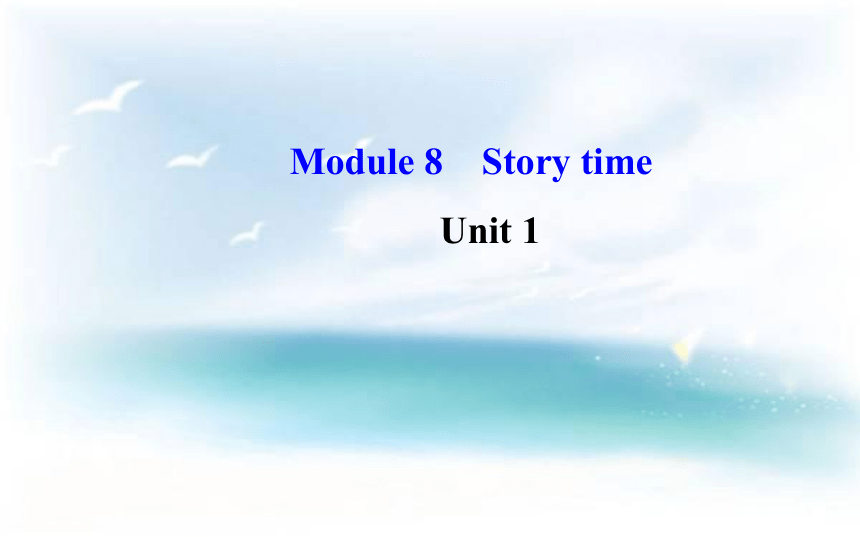
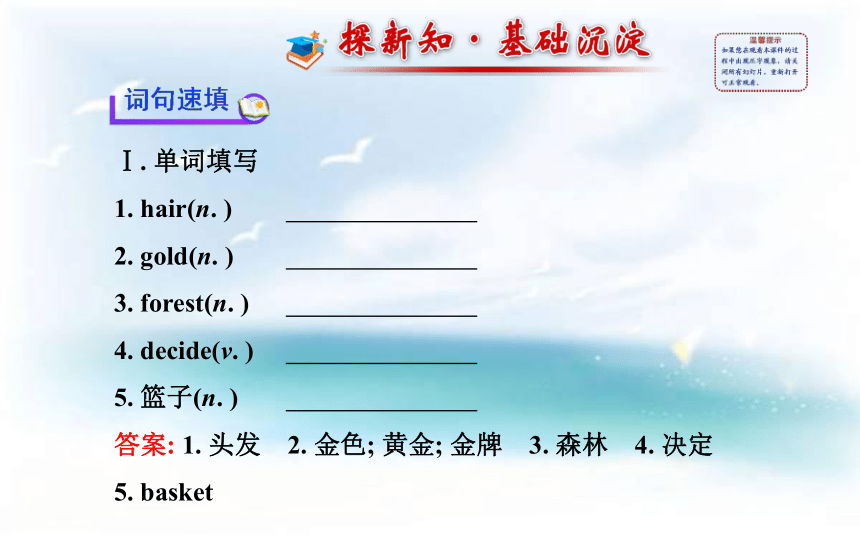
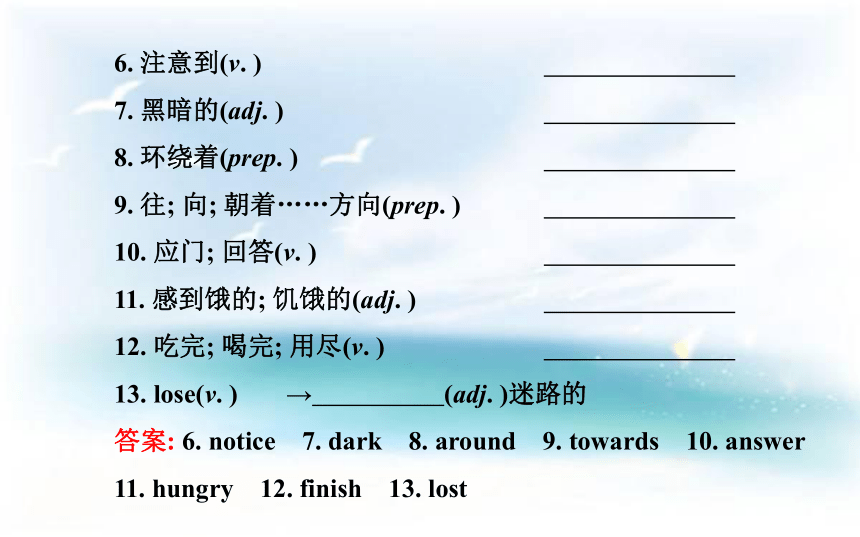
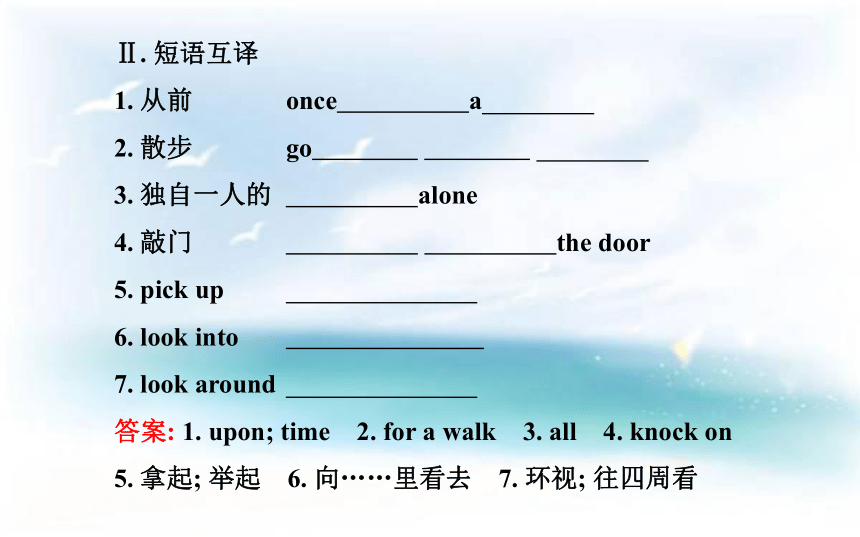
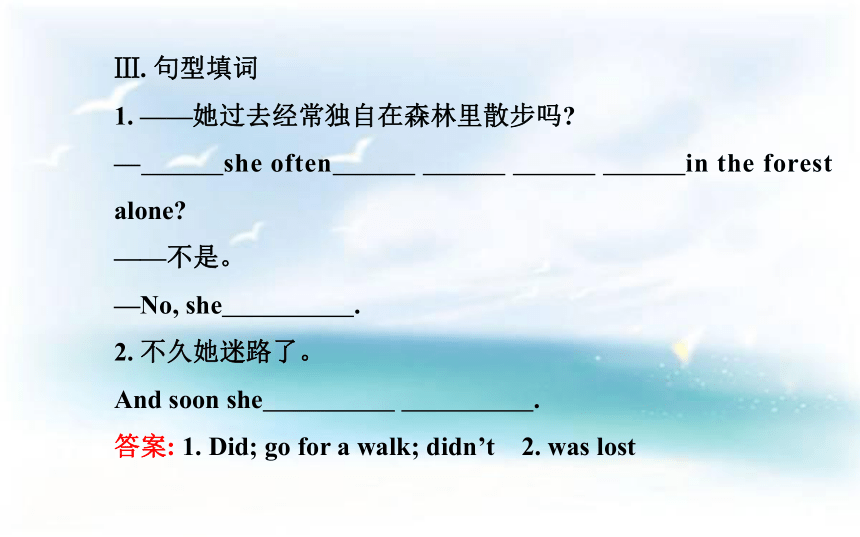
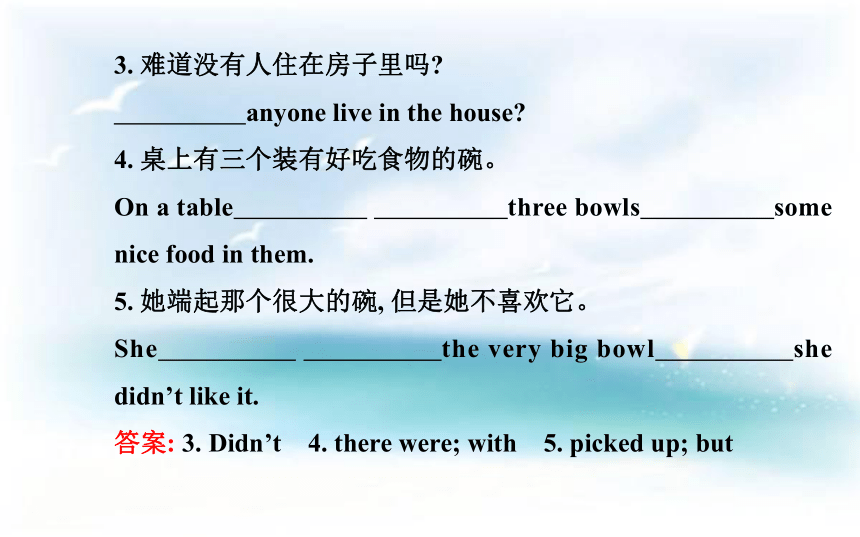
文档简介
课件85张PPT。Module 8
Story time
精讲导学 巧练激活【导语】生日对每一个人来说都是一个特殊的日子, 人们总会吃特殊的食物、做些特殊的事情来庆祝。你过生日都会做些什么呢? A long time ago, people in Germany started
making cakes for birthdays. In the morning people
put candles on a cake. The candles burned all day
long!
At night, people asked the birthday boy or girl to blow out the candles in one go and then wish for something special.
Birthdays are happy days. They are different around the world. But now many people around the world have birthday cakes with candles. Do you blow out candles on your birthday? Do you do something special on your birthday? 【词海拾贝】
Germany 德国 candle 蜡烛
blow out 吹灭 wish 祝愿
around the world 世界各地【我的感悟】
No matter what birthday food people have, the ideas are the same. They bring good luck to the birthday person.
(无论人们吃什么生日食品, 其蕴含的意义是一样的: 把好运带给过生日的寿星。)Module 8 Story time
Unit 1 Ⅰ. 单词填写
1. hair(n. ) ?
2. gold(n. ) ?
3. forest(n. ) ?
4. decide(v. ) ?
5. 篮子(n. ) ?
答案: 1. 头发 2. 金色; 黄金; 金牌 3. 森林 4. 决定
5. basket6. 注意到(v. ) ?
7. 黑暗的(adj. ) ?
8. 环绕着(prep. ) ?
9. 往; 向; 朝着……方向(prep. ) ?
10. 应门; 回答(v. ) ?
11. 感到饿的; 饥饿的(adj. ) ?
12. 吃完; 喝完; 用尽(v. ) ?
13. lose(v. ) → (adj. )迷路的
答案: 6. notice 7. dark 8. around 9. towards 10. answer
11. hungry 12. finish 13. lostⅡ. 短语互译
1. 从前 once a ?
2. 散步 go ?
3. 独自一人的 alone
4. 敲门 the door
5. pick up ?
6. look into ?
7. look around ?
答案: 1. upon; time 2. for a walk 3. all 4. knock on
5. 拿起; 举起 6. 向……里看去 7. 环视; 往四周看Ⅲ. 句型填词
1. ——她过去经常独自在森林里散步吗?
— she often in the forest alone?
——不是。
—No, she .
2. 不久她迷路了。
And soon she .
答案: 1. Did; go for a walk; didn’t 2. was lost3. 难道没有人住在房子里吗?
anyone live in the house?
4. 桌上有三个装有好吃食物的碗。
On a table three bowls some nice food in them.
5. 她端起那个很大的碗, 但是她不喜欢它。
She the very big bowl she didn’t like it.
答案: 3. Didn’t 4. there were; with 5. picked up; but Goldilocks went for a walk a 1 in the
dark forest. And soon she was l 2 . She
looked a 3 her and noticed a little house. She hurried t 4 it and k 5 on the door but nobody a 6 . She knocked again and again, finally she p 7 the door. It was open. She
e 8 the house and she looked into a small room. She noticed three bowls on the table. She was very h 9 . She picked up the little bowl and f 10 all the food in it. 1. 2. 3. 4. 5. ?
6. 7. 8. 9. 10. ?
答案: 1. alone 2. lost 3. around 4. towards 5. knocked
6. answered 7. pushed 8. entered 9. hungry 10. finished1. pick v. 采; 摘
【语境领悟】
*Goldilocks picked some flowers.
金凤花姑娘摘了一些花。
*She picked up the very big bowl.
她端起了那个特别大的碗。【自主归纳】pick的用法
(1)pick意为“采; 摘”, 常用的短语有pick flowers/apples采花/摘苹果;
(2)pick up为动副短语, 意为“拿起; 举起; 端起; 用车接某人”等。【温馨提示】pick up后面若跟代词, 要把代词放到up前面。【图解助记】【学以致用】
①(2014·绍兴中考)—Do you your son after school?
—No. He comes back home on the school bus.
A. pick up B. look after
C. drop in D. send for
②上周我们摘苹果了。
We last week.
答案: picked apples2. notice v. 注意到
【语境领悟】
*Then she noticed a little house.
然后她注意到一个小房子。
*I noticed Sally often dance in the yard.
我注意到萨利经常在院子里跳舞。
*I noticed a girl walking across the street.
我注意到一个女孩正在过街道。
*There is a notice on the wall.
墙上有一个通告。【自主归纳】notice的两种词性
(1)notice作动词, 意为“注意到”; 常用于以下搭配:
①notice sb. do表示“看到某人做某事的全过程”;
②notice sb. doing表示“注意到某人正在做某事”。
(2)notice作名词时, 意为“布告, 通告”。【学以致用】
①刚才我注意到那个人进了房间。
I the man the room just now.
②他注意到在他前面有一只大老虎。
He a big tiger in front of him.
③我看见他正在广场上打太极拳。
I him Taiji in the square.
答案: ①noticed; enter ②noticed ③noticed; playing3. decide v. 决定
【语境领悟】
*She decided to go for a walk in the park with her basket.
她决定带着她的篮子去公园散步。
*He decided not to tell his mother the truth.
他决定不告诉他妈妈真相。
*You have to make a decision before Friday.
你得在周五之前作出决定。【自主归纳】
(1)decide作动词, 常用于以下短语中:
①decide(not)to do sth. 意为“决定(不)做某事”;
②decide + that从句意为“决定……”。
(2)decide的名词形式为decision, 意为“决定”; 常构成搭配: make a decision意为“作出决定”。【学以致用】
①(2014·凉山中考)Has she made the (决定)yet?
答案: decision
②(2013·河北中考)The children decide their school yard this Friday afternoon.
A. clean B. to clean
C. cleaning D. cleanedⅠ. 用所给词的适当形式填空
1. I (pick)many flowers on the way home yesterday.
2. Goldilocks (knock)on the door, but nobody
(answer).
3. Long Long ago, there (live)a gold fish in the sea.
4. She notices the boy (play)games now.
5. He often goes to school (lone).
答案: 1. picked 2. knocked; answered 3. lived
4. playing 5. aloneⅡ. 完成句子
1. 进入办公室前请先敲门。
Please the door before you enter the office.
2. 你愿意和我去散步吗?
Would you like to with me?
3. 她捡起地上的钱包并决定把它交给老师。
She the wallet on the ground and to give it to the teacher.
答案: 1. knock on 2. go for a walk 3. picked up; decided4. 从前, 这里的人很穷。
, the people here were very poor.
5. 这个小女孩找不到她的同学, 很快迷路了。
The little girl couldn’t find her classmates and soon she .
答案: 4. Once upon a time 5. was lostModule 8 Story time
Unit 2?Ⅰ. 单词填写
1. either(adv. ) ?
2. asleep(adj. ) ?
3. return(v. ) ?
4. 哭; 叫喊(v. ) ?
5. 高声说; 大声喊(v. ) ?
6. 跳(v. ) ?
7. with(prep. ) → (prep. )(反义词)无; 没有
答案: 1. 也(不) 2. 睡着的 3. 返回; 归还 4. cry 5. shout
6. jump 7. withoutⅡ. 短语互译
1. be asleep ?
2. in pieces ?
3. at first ?
4. 指着…… at
5. 跳下床 jump bed
6. 从……冲出来 hurry ?
答案: 1. 睡着 2. 破碎 3. 首先; 起初 4. point 5. out of
6. out ofⅢ. 句型填词
1. 金凤花姑娘想要坐下因为她累了。
Goldilocks she was tired.
2. 它也不舒服。
It comfortable .
3. 不久她就睡着了。
Very soon she .
答案: 1. wanted to sit down because 2. was not; either
3. was asleep 4. 一开始他们没有注意到金凤花姑娘。
They Goldilocks .
5. 三只熊都围在她身边, 于是她从床上跳了下来, 也顾不上提篮子, 便冲出了房间。
The Three Bears her, so Goldilocks
and the house her basket.
答案: 4. didn’t notice; at first
5. were all around; jumped out of bed; hurried out of; without1. How was the small chair Goldilocks tried?
A. It was heavy.
B. It was not comfortable.
C. It was nice and comfortable.
D. It was very light.
2. How many beds were there in the bedroom?
A. One. B. Two. C. Three. D. Four. 3. How was Baby Bear after he came back home?
A. He was not happy. B. He was tired.
C. He was bored. D. He was happy.
4. Which of the following is TRUE?
A. Goldilocks didn’t try the big chair because it was too big.
B. The three bears didn’t see Goldilocks in their house.
C. Goldilocks didn’t take her basket out of the house.
D. Goldilocks was asleep in the middle bed. 1. either adv. 也(不)
【语境领悟】
*It was not comfortable either. 它也不舒服。
*—He can’t swim. 他不会游泳。
—I can’t swim, either. 我也不会。【自主归纳】【温馨提示】
either还可以用作“两者中的任何一个”。【学以致用】
(2014·安徽中考)You can take of the two toy cars and leave the other for your brother.
A. both B. none C. either D. neither2. asleep adj. 睡着的
【语境领悟】
*Very soon she was asleep. 她很快就睡着了。
*The children are asleep in the car.
孩子们在车上睡着了。【自主归纳】【学以致用】
(2013·白银中考)The little boy pretended when his mother came in.
A. sleeping B. asleep
C. be asleep D. to be asleep3. at first一开始; 起初
【语境领悟】
*They didn’t notice Goldilocks at first.
一开始他们没有注意到金凤花姑娘。
*At first I didn’t want to tell him this.
一开始我没想告诉他此事。【自主归纳】【学以致用】
(2013·德州中考) , the Internet was only used by the government. But now it’s widely used in every field.
A. As usual B. At first C. After all D. So farⅠ. 用方框中所给词的适当形式填空
around in without at into
1. Jim got up late this morning and he hurried to school
having breakfast.
2. Mrs Smith walked the classroom and she saw some beautiful flowers on the teacher’s desk.
3. Little Tom wanted to stay bed because he was sleepy.
答案: 1. without 2. into 3. in 4. In China, we shouldn’t point anyone with our chopsticks(筷子).
5. There are lots of trees and flowers the house. How beautiful!
答案: 4. at 5. aroundⅡ. 完成句子
1. ——我的杯子碎了。
——再给你一个。
—My glass .
—Here’s another one for you.
2. 起初, 吉姆没有注意到桌子底下的那只小猫。
Jim didn’t notice that little cat under the table.
3. 放学后孩子们匆忙地冲出了教室。
The children the classroom after school.
答案: 1. is in pieces 2. At first 3. hurried out of 4. ——我们什么时候返校?
——下周一。
—When shall we school?
—Next Monday.
5. 这个淘气的男孩从床上跳了下来跑走了。
This naughty boy bed and ran away.
答案: 4. return to 5. jumped out ofModule 8 Story time
Unit 3?一般过去时(2)
【观察领悟】
仔细观察例句, 体会句中动词的变化。
1. Goldilocks picked some flowers.
2. Then she noticed a little house.
3. So she hurried towards it, and knocked on the door.
4. She stopped in front of the house.
5. —Did she often go for a walk in the forest alone?
—No, she didn’t.
6. She picked up the very big bowl but she didn’t like it. 【知识构建】
(一)行为动词过去式的构成【巧学助记】规则动词过去式构成方法口诀
过去式构成有方法, 一般词尾把-ed加。
如果词尾有个e, 直接加-d就可以。
“辅音字母+y”结尾, 变y为i加-ed。
“一辅重闭”作尾巴, 双写该辅音加-ed。(二)行为动词的一般过去时的否定形式
要借助助动词did来构成, 然后在其后加not, 可缩写为didn’t, 并且将动词的过去式变为动词原形。即主语+didn’t+动词原形+其他。例如: I didn’t walk to school today. 我今天没有步行去上学。
(三)行为动词的一般过去时的一般疑问句形式
要借助did来构成, 要将其放在句首, 且该句中动词的过去式变为动词原形。即Did +主语+动词原形+其他。例如: Did you listen to the news in the morning?
你早上听新闻了吗? 【温馨提示】
在疑问句和否定句中, 由于加了助动词did/didn’t, 谓语动词要用原形。【学以致用】
Ⅰ. 用所给词的适当形式填空
1. We (visit)a museum last week.
2. We (not go)to the zoo last Sunday.
3. he (study)in this school two years ago?
4. What you (do)last summer vacation?
5. Kate (stay)at home and (read)books last night.
6. They (not play)soccer yesterday afternoon.
答案: 1. visited 2. didn’t go 3. Did; study 4. did; do
5. stayed; read 6. didn’t playⅡ. 句型转换
1. I finished my homework at six. (改为否定句)
I my homework at six.
2. We moved to London in 2009. (改为一般疑问句并作肯定回答)
— you to London in 2009?
—Yes, .
3. Did they play computer games yesterday? (改为肯定句)
They computer games yesterday.
答案: 1. didn’t finish 2. Did; move; we did 3. played 4. Lucy didn’t do her homework yesterday evening. (改为肯定句)
Lucy her homework yesterday evening.
5. Mother did cleaning after dinner. (改为一般疑问句并作否定回答)
— Mother cleaning after dinner?
—No, .
答案: 4. did 5. Did; do; she didn’t “龟兔赛跑”是我们从小就耳熟能详的故事, 根据图片内容, 写一篇80个词左右的小故事。
要求: 字迹工整, 语言流畅, 表达正确, 逻辑清晰。
提示词: rabbit兔子 tortoise乌龟 have a race赛跑
go on running继续跑 wake up醒来
the finishing line终点线【思路点拨】
(1)体裁: 记叙文
(2)人称: 第三人称
(3)时态: 一般过去时【写作模板】【妙笔成篇】
_____________________________________________________________________________________________________________________________________________________________________________________________________________________________________________________________________________【参考范文】
Once upon a time, there lived a rabbit and a tortoise in the forest. One day, they had a race. At first, the rabbit hurried in front of the tortoise. Then he was tired, and wanted to have a break. So he lay on the road and soon was asleep. But the tortoise didn’t stop, he went on running. Finally, the rabbit woke up, but it was too late. The tortoise got to the finishing line. Ⅰ. 用方框中所给词的适当形式填空
enter, hurry, jump, notice, point, return, try, answer
1. I knocked on the door, but nobody .
2. The student out of the classroom to meet his mother.
3. Goldilocks three beds, and she liked the small one.
4. We Tom the shop again.
5. Lucy out of bed when she heard the news.
6. The boy at the picture and said“It’s me. ”
7. Please to your classroom after the meeting.
答案: 1. answered 2. hurried 3. tried 4. noticed; enter
5. jumped 6. pointed 7. returnⅡ. 句型转换
1. Zhao Yuting is playing the game with her friends. (用yesterday改写句子)
Zhao Yuting the game with her friends yesterday.
2. Joan did the housework last night. (改为否定句)
Joan the housework last night.
3. Becky decided to clean her bedroom. (改为一般疑问句, 并作肯定回答)
Becky to clean her bedroom?
Yes, .
答案: 1. played 2. didn’t do 3. Did; decide; she did 4. No one helped Lucy do the work. (改为同义句)
Lucy did the work .
5. Wen Ya didn’t say any words and left the room. (改为同义句)
Wen Ya left the room any words.
答案: 4. all alone 5. without saying模块复习课
Module 8 Story timeⅠ. 词汇速记
1. 森林(n. ) ?
2. 篮子(n. ) ?
3. 黑暗的(adj. ) ?
4. 采; 摘(v. ) ?
5. 立刻; 不久(adv. ) ?
答案: 1. forest 2. basket 3. dark 4. pick 5. soon 6. 吃完; 喝完; 用尽(v. ) ?
7. 碗(n. ) ?
8. 小的(adj. ) ?
9. 往; 向; 朝……方向(prep. ) ?
10. 合适的; 恰当的(adj. ) ?
答案: 6. finish 7. bowl 8. little 9. towards 10. rightⅡ. 短语互译
1. 从前 a time
2. 决定做某事 do sth.
3. 散步 a walk
4. 独自一人的 all ?
5. 拿起; 举起 up
答案: 1. once upon 2. decide to 3. go for 4. alone 5. pick6. be lost ?
7. notice a house ?
8. look around ?
9. knock on the door ?
10. enter the room ?
答案: 6. 迷路 7. 注意到一个房子 8. 环视 9. 敲门
10. 进入房间Ⅲ. 句型攻关
1. 从前有一个老人住在山里。
, there lived an old man in the mountains.
2. 我现在住在广州, 但是两年前我住在山东。
I in Guangzhou now, but I in Shandong two years ago.
答案: 1. Once upon a time 2. live; lived3. ——你昨天给父母打电话了吗?
— you your parents yesterday?
——是的。
—Yes, I .
4. 他上周没有看望姑妈。
He his aunt last week.
5. 露西不喜欢香蕉, 我也不喜欢。
Lucy doesn’t like bananas, I like .
答案: 3. Did; call/telephone; did 4. didn’t see/visit 5. don’t; eitherⅣ. 语法专练
用所给词的适当形式填空
1. They (visit) the museum last week, but they
(not visit) the factory.
2. — you (listen) to music this morning?
—Yes, I .
3. Uncle Sam (finish) his work last Sunday.
4. The little girl (hurry) to the little house and
(knock) on the door just now.
答案: 1. visited; didn’t visit 2. Did; listen; did 3. finished
4. hurried; knockedⅤ. 真题体验
1. (2014·黔南州中考)He came back late, his father was very angry.
A. arrived B. gave back C. returned D. reached
【解析】选C。考查词义转换。come back = return返回来。2. (2014·台州中考)—Where are you going?
—To the library. I’ve finished reading this book, so I’m going
to it.
A. buy B. throw C. return D. borrow
【解析】选C。考查动词辨析。句意: ——你打算去哪儿?
——去图书馆。我已经读完了这本书, 所以我打算去还它。
buy买; throw扔; return归还; borrow借。3. (2014·福州中考)Don’t go to school breakfast. It’s a bad habit.
A. after B. with C. without
【解析】选C。考查介词用法。句意: 不要不吃早饭就去上学。这是个坏习惯。after在……之后; with带有; without没有。4. (2014·白银中考)Mom always tells me that nothing can be learned hard work.
A. with B. by C. for D. without
【解析】选D。考查介词用法。句意: 妈妈总是告诉我没有勤奋的工作什么也学不到。without没有。5. (2014·河北中考)Someone at the door. Can you open it?
A. knocks B. knocked
C. is knocking D. was knocking
【解析】选C。考查时态。句意: 有人在敲门。你能去开门吗? 由句意可知应该用现在进行时, someone作主语时, 谓语动词用单数第三人称形式。6. (2014·嘉兴中考)Tom the piano every day when he was in primary school.
A. plays B. played
C. was playing D. has played
【解析】选B。考查时态。句意: Tom在小学时每天都弹钢琴。由when he was in primary school可知, 应该用一般过去时。7. (2014·长沙中考)—Your brother is an excellent basketball player.
—So he is. He to play basketball three years ago.
A. has started B. starts C. started
【解析】选C。考查时态。根据时间状语three years ago可知用一般过去时。8. (2014·扬州中考)—Has your friend completed his design?
—Not yet. He on it last night.
A. worked B. has worked
C. is working D. was working
【解析】选A。考查时态。根据时间状语last night可知用一般过去时。9. (2014·绥化中考)The little girl fell (sleep) in her mother’s arms.
答案: asleep
10. (2014·宿迁中考)如果你去一个陌生的地方, 很容易迷路。
It’s easy to if you go to a strange place.
答案: be/get lost11. (2014·白银中考)The teacher explained to us the puzzling problem yesterday afternoon. (改为一般疑问句)
the teacher to you the puzzling problem yesterday afternoon?
答案: Did; explain
Story time
精讲导学 巧练激活【导语】生日对每一个人来说都是一个特殊的日子, 人们总会吃特殊的食物、做些特殊的事情来庆祝。你过生日都会做些什么呢? A long time ago, people in Germany started
making cakes for birthdays. In the morning people
put candles on a cake. The candles burned all day
long!
At night, people asked the birthday boy or girl to blow out the candles in one go and then wish for something special.
Birthdays are happy days. They are different around the world. But now many people around the world have birthday cakes with candles. Do you blow out candles on your birthday? Do you do something special on your birthday? 【词海拾贝】
Germany 德国 candle 蜡烛
blow out 吹灭 wish 祝愿
around the world 世界各地【我的感悟】
No matter what birthday food people have, the ideas are the same. They bring good luck to the birthday person.
(无论人们吃什么生日食品, 其蕴含的意义是一样的: 把好运带给过生日的寿星。)Module 8 Story time
Unit 1 Ⅰ. 单词填写
1. hair(n. ) ?
2. gold(n. ) ?
3. forest(n. ) ?
4. decide(v. ) ?
5. 篮子(n. ) ?
答案: 1. 头发 2. 金色; 黄金; 金牌 3. 森林 4. 决定
5. basket6. 注意到(v. ) ?
7. 黑暗的(adj. ) ?
8. 环绕着(prep. ) ?
9. 往; 向; 朝着……方向(prep. ) ?
10. 应门; 回答(v. ) ?
11. 感到饿的; 饥饿的(adj. ) ?
12. 吃完; 喝完; 用尽(v. ) ?
13. lose(v. ) → (adj. )迷路的
答案: 6. notice 7. dark 8. around 9. towards 10. answer
11. hungry 12. finish 13. lostⅡ. 短语互译
1. 从前 once a ?
2. 散步 go ?
3. 独自一人的 alone
4. 敲门 the door
5. pick up ?
6. look into ?
7. look around ?
答案: 1. upon; time 2. for a walk 3. all 4. knock on
5. 拿起; 举起 6. 向……里看去 7. 环视; 往四周看Ⅲ. 句型填词
1. ——她过去经常独自在森林里散步吗?
— she often in the forest alone?
——不是。
—No, she .
2. 不久她迷路了。
And soon she .
答案: 1. Did; go for a walk; didn’t 2. was lost3. 难道没有人住在房子里吗?
anyone live in the house?
4. 桌上有三个装有好吃食物的碗。
On a table three bowls some nice food in them.
5. 她端起那个很大的碗, 但是她不喜欢它。
She the very big bowl she didn’t like it.
答案: 3. Didn’t 4. there were; with 5. picked up; but Goldilocks went for a walk a 1 in the
dark forest. And soon she was l 2 . She
looked a 3 her and noticed a little house. She hurried t 4 it and k 5 on the door but nobody a 6 . She knocked again and again, finally she p 7 the door. It was open. She
e 8 the house and she looked into a small room. She noticed three bowls on the table. She was very h 9 . She picked up the little bowl and f 10 all the food in it. 1. 2. 3. 4. 5. ?
6. 7. 8. 9. 10. ?
答案: 1. alone 2. lost 3. around 4. towards 5. knocked
6. answered 7. pushed 8. entered 9. hungry 10. finished1. pick v. 采; 摘
【语境领悟】
*Goldilocks picked some flowers.
金凤花姑娘摘了一些花。
*She picked up the very big bowl.
她端起了那个特别大的碗。【自主归纳】pick的用法
(1)pick意为“采; 摘”, 常用的短语有pick flowers/apples采花/摘苹果;
(2)pick up为动副短语, 意为“拿起; 举起; 端起; 用车接某人”等。【温馨提示】pick up后面若跟代词, 要把代词放到up前面。【图解助记】【学以致用】
①(2014·绍兴中考)—Do you your son after school?
—No. He comes back home on the school bus.
A. pick up B. look after
C. drop in D. send for
②上周我们摘苹果了。
We last week.
答案: picked apples2. notice v. 注意到
【语境领悟】
*Then she noticed a little house.
然后她注意到一个小房子。
*I noticed Sally often dance in the yard.
我注意到萨利经常在院子里跳舞。
*I noticed a girl walking across the street.
我注意到一个女孩正在过街道。
*There is a notice on the wall.
墙上有一个通告。【自主归纳】notice的两种词性
(1)notice作动词, 意为“注意到”; 常用于以下搭配:
①notice sb. do表示“看到某人做某事的全过程”;
②notice sb. doing表示“注意到某人正在做某事”。
(2)notice作名词时, 意为“布告, 通告”。【学以致用】
①刚才我注意到那个人进了房间。
I the man the room just now.
②他注意到在他前面有一只大老虎。
He a big tiger in front of him.
③我看见他正在广场上打太极拳。
I him Taiji in the square.
答案: ①noticed; enter ②noticed ③noticed; playing3. decide v. 决定
【语境领悟】
*She decided to go for a walk in the park with her basket.
她决定带着她的篮子去公园散步。
*He decided not to tell his mother the truth.
他决定不告诉他妈妈真相。
*You have to make a decision before Friday.
你得在周五之前作出决定。【自主归纳】
(1)decide作动词, 常用于以下短语中:
①decide(not)to do sth. 意为“决定(不)做某事”;
②decide + that从句意为“决定……”。
(2)decide的名词形式为decision, 意为“决定”; 常构成搭配: make a decision意为“作出决定”。【学以致用】
①(2014·凉山中考)Has she made the (决定)yet?
答案: decision
②(2013·河北中考)The children decide their school yard this Friday afternoon.
A. clean B. to clean
C. cleaning D. cleanedⅠ. 用所给词的适当形式填空
1. I (pick)many flowers on the way home yesterday.
2. Goldilocks (knock)on the door, but nobody
(answer).
3. Long Long ago, there (live)a gold fish in the sea.
4. She notices the boy (play)games now.
5. He often goes to school (lone).
答案: 1. picked 2. knocked; answered 3. lived
4. playing 5. aloneⅡ. 完成句子
1. 进入办公室前请先敲门。
Please the door before you enter the office.
2. 你愿意和我去散步吗?
Would you like to with me?
3. 她捡起地上的钱包并决定把它交给老师。
She the wallet on the ground and to give it to the teacher.
答案: 1. knock on 2. go for a walk 3. picked up; decided4. 从前, 这里的人很穷。
, the people here were very poor.
5. 这个小女孩找不到她的同学, 很快迷路了。
The little girl couldn’t find her classmates and soon she .
答案: 4. Once upon a time 5. was lostModule 8 Story time
Unit 2?Ⅰ. 单词填写
1. either(adv. ) ?
2. asleep(adj. ) ?
3. return(v. ) ?
4. 哭; 叫喊(v. ) ?
5. 高声说; 大声喊(v. ) ?
6. 跳(v. ) ?
7. with(prep. ) → (prep. )(反义词)无; 没有
答案: 1. 也(不) 2. 睡着的 3. 返回; 归还 4. cry 5. shout
6. jump 7. withoutⅡ. 短语互译
1. be asleep ?
2. in pieces ?
3. at first ?
4. 指着…… at
5. 跳下床 jump bed
6. 从……冲出来 hurry ?
答案: 1. 睡着 2. 破碎 3. 首先; 起初 4. point 5. out of
6. out ofⅢ. 句型填词
1. 金凤花姑娘想要坐下因为她累了。
Goldilocks she was tired.
2. 它也不舒服。
It comfortable .
3. 不久她就睡着了。
Very soon she .
答案: 1. wanted to sit down because 2. was not; either
3. was asleep 4. 一开始他们没有注意到金凤花姑娘。
They Goldilocks .
5. 三只熊都围在她身边, 于是她从床上跳了下来, 也顾不上提篮子, 便冲出了房间。
The Three Bears her, so Goldilocks
and the house her basket.
答案: 4. didn’t notice; at first
5. were all around; jumped out of bed; hurried out of; without1. How was the small chair Goldilocks tried?
A. It was heavy.
B. It was not comfortable.
C. It was nice and comfortable.
D. It was very light.
2. How many beds were there in the bedroom?
A. One. B. Two. C. Three. D. Four. 3. How was Baby Bear after he came back home?
A. He was not happy. B. He was tired.
C. He was bored. D. He was happy.
4. Which of the following is TRUE?
A. Goldilocks didn’t try the big chair because it was too big.
B. The three bears didn’t see Goldilocks in their house.
C. Goldilocks didn’t take her basket out of the house.
D. Goldilocks was asleep in the middle bed. 1. either adv. 也(不)
【语境领悟】
*It was not comfortable either. 它也不舒服。
*—He can’t swim. 他不会游泳。
—I can’t swim, either. 我也不会。【自主归纳】【温馨提示】
either还可以用作“两者中的任何一个”。【学以致用】
(2014·安徽中考)You can take of the two toy cars and leave the other for your brother.
A. both B. none C. either D. neither2. asleep adj. 睡着的
【语境领悟】
*Very soon she was asleep. 她很快就睡着了。
*The children are asleep in the car.
孩子们在车上睡着了。【自主归纳】【学以致用】
(2013·白银中考)The little boy pretended when his mother came in.
A. sleeping B. asleep
C. be asleep D. to be asleep3. at first一开始; 起初
【语境领悟】
*They didn’t notice Goldilocks at first.
一开始他们没有注意到金凤花姑娘。
*At first I didn’t want to tell him this.
一开始我没想告诉他此事。【自主归纳】【学以致用】
(2013·德州中考) , the Internet was only used by the government. But now it’s widely used in every field.
A. As usual B. At first C. After all D. So farⅠ. 用方框中所给词的适当形式填空
around in without at into
1. Jim got up late this morning and he hurried to school
having breakfast.
2. Mrs Smith walked the classroom and she saw some beautiful flowers on the teacher’s desk.
3. Little Tom wanted to stay bed because he was sleepy.
答案: 1. without 2. into 3. in 4. In China, we shouldn’t point anyone with our chopsticks(筷子).
5. There are lots of trees and flowers the house. How beautiful!
答案: 4. at 5. aroundⅡ. 完成句子
1. ——我的杯子碎了。
——再给你一个。
—My glass .
—Here’s another one for you.
2. 起初, 吉姆没有注意到桌子底下的那只小猫。
Jim didn’t notice that little cat under the table.
3. 放学后孩子们匆忙地冲出了教室。
The children the classroom after school.
答案: 1. is in pieces 2. At first 3. hurried out of 4. ——我们什么时候返校?
——下周一。
—When shall we school?
—Next Monday.
5. 这个淘气的男孩从床上跳了下来跑走了。
This naughty boy bed and ran away.
答案: 4. return to 5. jumped out ofModule 8 Story time
Unit 3?一般过去时(2)
【观察领悟】
仔细观察例句, 体会句中动词的变化。
1. Goldilocks picked some flowers.
2. Then she noticed a little house.
3. So she hurried towards it, and knocked on the door.
4. She stopped in front of the house.
5. —Did she often go for a walk in the forest alone?
—No, she didn’t.
6. She picked up the very big bowl but she didn’t like it. 【知识构建】
(一)行为动词过去式的构成【巧学助记】规则动词过去式构成方法口诀
过去式构成有方法, 一般词尾把-ed加。
如果词尾有个e, 直接加-d就可以。
“辅音字母+y”结尾, 变y为i加-ed。
“一辅重闭”作尾巴, 双写该辅音加-ed。(二)行为动词的一般过去时的否定形式
要借助助动词did来构成, 然后在其后加not, 可缩写为didn’t, 并且将动词的过去式变为动词原形。即主语+didn’t+动词原形+其他。例如: I didn’t walk to school today. 我今天没有步行去上学。
(三)行为动词的一般过去时的一般疑问句形式
要借助did来构成, 要将其放在句首, 且该句中动词的过去式变为动词原形。即Did +主语+动词原形+其他。例如: Did you listen to the news in the morning?
你早上听新闻了吗? 【温馨提示】
在疑问句和否定句中, 由于加了助动词did/didn’t, 谓语动词要用原形。【学以致用】
Ⅰ. 用所给词的适当形式填空
1. We (visit)a museum last week.
2. We (not go)to the zoo last Sunday.
3. he (study)in this school two years ago?
4. What you (do)last summer vacation?
5. Kate (stay)at home and (read)books last night.
6. They (not play)soccer yesterday afternoon.
答案: 1. visited 2. didn’t go 3. Did; study 4. did; do
5. stayed; read 6. didn’t playⅡ. 句型转换
1. I finished my homework at six. (改为否定句)
I my homework at six.
2. We moved to London in 2009. (改为一般疑问句并作肯定回答)
— you to London in 2009?
—Yes, .
3. Did they play computer games yesterday? (改为肯定句)
They computer games yesterday.
答案: 1. didn’t finish 2. Did; move; we did 3. played 4. Lucy didn’t do her homework yesterday evening. (改为肯定句)
Lucy her homework yesterday evening.
5. Mother did cleaning after dinner. (改为一般疑问句并作否定回答)
— Mother cleaning after dinner?
—No, .
答案: 4. did 5. Did; do; she didn’t “龟兔赛跑”是我们从小就耳熟能详的故事, 根据图片内容, 写一篇80个词左右的小故事。
要求: 字迹工整, 语言流畅, 表达正确, 逻辑清晰。
提示词: rabbit兔子 tortoise乌龟 have a race赛跑
go on running继续跑 wake up醒来
the finishing line终点线【思路点拨】
(1)体裁: 记叙文
(2)人称: 第三人称
(3)时态: 一般过去时【写作模板】【妙笔成篇】
_____________________________________________________________________________________________________________________________________________________________________________________________________________________________________________________________________________【参考范文】
Once upon a time, there lived a rabbit and a tortoise in the forest. One day, they had a race. At first, the rabbit hurried in front of the tortoise. Then he was tired, and wanted to have a break. So he lay on the road and soon was asleep. But the tortoise didn’t stop, he went on running. Finally, the rabbit woke up, but it was too late. The tortoise got to the finishing line. Ⅰ. 用方框中所给词的适当形式填空
enter, hurry, jump, notice, point, return, try, answer
1. I knocked on the door, but nobody .
2. The student out of the classroom to meet his mother.
3. Goldilocks three beds, and she liked the small one.
4. We Tom the shop again.
5. Lucy out of bed when she heard the news.
6. The boy at the picture and said“It’s me. ”
7. Please to your classroom after the meeting.
答案: 1. answered 2. hurried 3. tried 4. noticed; enter
5. jumped 6. pointed 7. returnⅡ. 句型转换
1. Zhao Yuting is playing the game with her friends. (用yesterday改写句子)
Zhao Yuting the game with her friends yesterday.
2. Joan did the housework last night. (改为否定句)
Joan the housework last night.
3. Becky decided to clean her bedroom. (改为一般疑问句, 并作肯定回答)
Becky to clean her bedroom?
Yes, .
答案: 1. played 2. didn’t do 3. Did; decide; she did 4. No one helped Lucy do the work. (改为同义句)
Lucy did the work .
5. Wen Ya didn’t say any words and left the room. (改为同义句)
Wen Ya left the room any words.
答案: 4. all alone 5. without saying模块复习课
Module 8 Story timeⅠ. 词汇速记
1. 森林(n. ) ?
2. 篮子(n. ) ?
3. 黑暗的(adj. ) ?
4. 采; 摘(v. ) ?
5. 立刻; 不久(adv. ) ?
答案: 1. forest 2. basket 3. dark 4. pick 5. soon 6. 吃完; 喝完; 用尽(v. ) ?
7. 碗(n. ) ?
8. 小的(adj. ) ?
9. 往; 向; 朝……方向(prep. ) ?
10. 合适的; 恰当的(adj. ) ?
答案: 6. finish 7. bowl 8. little 9. towards 10. rightⅡ. 短语互译
1. 从前 a time
2. 决定做某事 do sth.
3. 散步 a walk
4. 独自一人的 all ?
5. 拿起; 举起 up
答案: 1. once upon 2. decide to 3. go for 4. alone 5. pick6. be lost ?
7. notice a house ?
8. look around ?
9. knock on the door ?
10. enter the room ?
答案: 6. 迷路 7. 注意到一个房子 8. 环视 9. 敲门
10. 进入房间Ⅲ. 句型攻关
1. 从前有一个老人住在山里。
, there lived an old man in the mountains.
2. 我现在住在广州, 但是两年前我住在山东。
I in Guangzhou now, but I in Shandong two years ago.
答案: 1. Once upon a time 2. live; lived3. ——你昨天给父母打电话了吗?
— you your parents yesterday?
——是的。
—Yes, I .
4. 他上周没有看望姑妈。
He his aunt last week.
5. 露西不喜欢香蕉, 我也不喜欢。
Lucy doesn’t like bananas, I like .
答案: 3. Did; call/telephone; did 4. didn’t see/visit 5. don’t; eitherⅣ. 语法专练
用所给词的适当形式填空
1. They (visit) the museum last week, but they
(not visit) the factory.
2. — you (listen) to music this morning?
—Yes, I .
3. Uncle Sam (finish) his work last Sunday.
4. The little girl (hurry) to the little house and
(knock) on the door just now.
答案: 1. visited; didn’t visit 2. Did; listen; did 3. finished
4. hurried; knockedⅤ. 真题体验
1. (2014·黔南州中考)He came back late, his father was very angry.
A. arrived B. gave back C. returned D. reached
【解析】选C。考查词义转换。come back = return返回来。2. (2014·台州中考)—Where are you going?
—To the library. I’ve finished reading this book, so I’m going
to it.
A. buy B. throw C. return D. borrow
【解析】选C。考查动词辨析。句意: ——你打算去哪儿?
——去图书馆。我已经读完了这本书, 所以我打算去还它。
buy买; throw扔; return归还; borrow借。3. (2014·福州中考)Don’t go to school breakfast. It’s a bad habit.
A. after B. with C. without
【解析】选C。考查介词用法。句意: 不要不吃早饭就去上学。这是个坏习惯。after在……之后; with带有; without没有。4. (2014·白银中考)Mom always tells me that nothing can be learned hard work.
A. with B. by C. for D. without
【解析】选D。考查介词用法。句意: 妈妈总是告诉我没有勤奋的工作什么也学不到。without没有。5. (2014·河北中考)Someone at the door. Can you open it?
A. knocks B. knocked
C. is knocking D. was knocking
【解析】选C。考查时态。句意: 有人在敲门。你能去开门吗? 由句意可知应该用现在进行时, someone作主语时, 谓语动词用单数第三人称形式。6. (2014·嘉兴中考)Tom the piano every day when he was in primary school.
A. plays B. played
C. was playing D. has played
【解析】选B。考查时态。句意: Tom在小学时每天都弹钢琴。由when he was in primary school可知, 应该用一般过去时。7. (2014·长沙中考)—Your brother is an excellent basketball player.
—So he is. He to play basketball three years ago.
A. has started B. starts C. started
【解析】选C。考查时态。根据时间状语three years ago可知用一般过去时。8. (2014·扬州中考)—Has your friend completed his design?
—Not yet. He on it last night.
A. worked B. has worked
C. is working D. was working
【解析】选A。考查时态。根据时间状语last night可知用一般过去时。9. (2014·绥化中考)The little girl fell (sleep) in her mother’s arms.
答案: asleep
10. (2014·宿迁中考)如果你去一个陌生的地方, 很容易迷路。
It’s easy to if you go to a strange place.
答案: be/get lost11. (2014·白银中考)The teacher explained to us the puzzling problem yesterday afternoon. (改为一般疑问句)
the teacher to you the puzzling problem yesterday afternoon?
答案: Did; explain
同课章节目录
- Module 1 Lost and found
- Unit 1 Whose bag is this?
- Unit 2 Are they yours?
- Unit 3 Language in use
- Module 2 What can you do ?
- Unit 1 I can play the piano
- Unit 2 I can run really fast
- Unit 3 Language in use
- Module 3 Making plans
- Unit 1 What are you going to do at the weekends?
- Unit 2 We're going to cheer the players.
- Unit 3 Language in use
- Module 4 Life in the future
- Unit 1 Everyone will study at home
- Unit 2 Every family will have a small plane.
- Unit 3 Language in use
- Module 5 Shopping
- Unit 1 What can I do for you?
- Unit 2 You can buy everything on the Internet
- Unit 3 Language in use
- Module 6 Around town
- Unit 1 Could you tell me how to get to the Nationa
- Unit 2 The London Eye is on your right.
- Unit 3 Language in use
- Revision module A
- Module 7 My past life
- Unit 1 I was born in a small village.
- Unit 2 I was born in Quincy.
- Unit 3 Language in use
- Module 8 Story time
- Unit 1 Once upon a time….
- Unit 2 Goldilocks hurried out of the house.
- Unit 3 Language in use
- Module 9 Life history
- Unit 1 He left school and began work at the age of
- Unit 2 He decided to be an actor.
- Unit 3 Language in use
- Module 10 A holiday journey
- Unit 1 What did you do?
- Unit 2 This morning we took a walk.
- Unit 3 Language in use
- Module 11 Body language
- Unit 1 They touch noses!
- Unit 2 Here are some ways to welcome them.
- Unit 3 Language in use
- Module 12 Western music
- Unit 1 It's so beautiful!
- Unit 2 Vienna is the centre of European classical
- Unit 3 Language in use
- Revision module B
